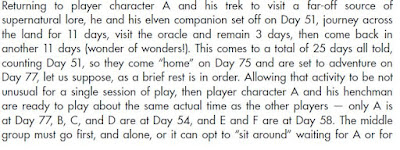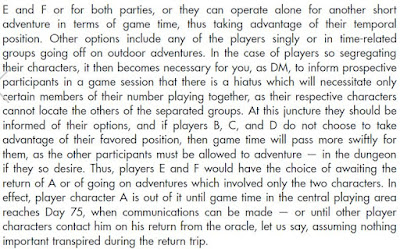I am currently running about 12 players in my AD&D 1e campaign in roughly 3 three groups.. This means that I must keep STRICT TIME RECORDS as gary mentions.
But why?
Let's look at the very, very good example Gary gives us in the AD&D 1e Dungeon Master's Guide starting on page 27.
This is solid and clear - two groups of players are mentioned and this is no overlap at this time. In session #1 Group 1 adventures to Game Day 50. In session #2 Group 2 starts on Game Day 51 and end on Game Day 54. In session #3 Group 3 starts on Game Day 55 because they were part of Group 1 and some time elapsed because their characters were not 'actively adventuring (i.e., in the middle of something in-game).
More from the example:
In session #4 we finally get back to the last part of Group 1and he is now finishing his adventure which was 'frozen' at day 50 because his character was in the middle of an active adventure. Not in town, not training, etc., but 'on the road' where things like random encounters happen. While Real World days in between sessions added to Game Day count for the other groups they weren't 'actively adventuring' during those off days. At the end of session #4 Group 1 is on Game Day 75.
But Group 2 are on Game day 54 and Group 3 on Game Day 58 - they can't even talk to each other, really!
THAT is why you need to keep strict time records! So as they prepare for session #5 the players have an issue - the characters are separated by time. What to do?
Again, it is already right there. The adventurers in the 'back' (Game Day 54) could simply say,
"We wait in town until we meet Group 3"
i.e., 'skip forward' in Game Days so both groups are on Game Day 58. Indeed, both groups could decide to 'skip forward' in Game Days until all the characters are on Game Day 75 and any character can interact with any other.
This is also why all my players end up with multiple characters. Training, long journeys, etc. can isolate some characters in time. The massive Anniversary Game of 2022 was about a huge adventure for 10 characters that were 22 months "in the past" in Game Time! If every player has 2-4 characters the odds of them being 'time locked' so they cannot play decrease. It does mean the DM has to track more individual characters, though!
Just in these brief snippets of the example from the DMG you can see that time is not a bludgeon, but a tool. Gary shows us how to freeze time, speed time up, etc. so that it makes your world internally consistent without making time more important than players.
Gary mentioned the entire 'if no actual play is happened 1 Real World day = 1 Game Day' which is generally a good rule just like 'how long would it take me to empty a backpack? = 'let's empty a back pack in real time and see!'. It adds more verisimilitude to the game, forcefully reminds players that downtime activities are real, and helps keep the calendar of the game world running. But notice that while Gary's example of campaign time covers five game sessions (the 4 complete ones and the 5th about to start at the end) he mentions Real World time only once! Its obvious that he viewed this as just as subject to reason, playability, and things like real world illness and disasters.



No comments:
Post a Comment